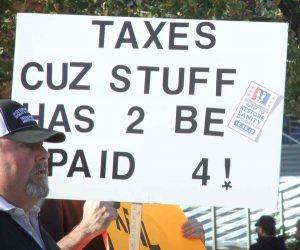Elephants, Taxes, and Where We Live
By Marcia Pally

Last week, we had a torrent of news about Donald Trump’s taxes—profits, losses, and massive tax avoidance. This was just about the time I was looking at the book Circling the Elephant, and it turns out that one has quite a bit to say about the other. Circling the Elephant, by John Thatamanil, professor at Union Theological Seminary and Counterpoint blogger, aims at developing criteria for a theology of religious diversity: in our effort to understand the world, what or how do we need to think in order to draw from more than one wisdom tradition? The book is a spectacular exploration for anyone wanting to look beyond one’s “own” tradition, but it’s also a primer for how to think about any “other”—any religious, political, social “someone(s)” different from oneself. Indeed, different enough to prod suspicion, fear, hostility, or rejection.
Among Thatamanil’s essentials are the notions of (i) difference without incommensurability, where “traditions [what other people believe] are different enough that we have something new to learn from them, but not so different as to be incommensurable.” That is, not so different as to have no bearing on the way we think and live. This implies (ii) that we have something to learn from people who think differently from the way we do and (iii) that we’re “intrinsically” interested in them because (iv) at least some aspects of their beliefs we recognize as having merit (pp. 67-68).
At this point, I could write about how we should consider these criteria in our politically fraught world, where us–them “othering” is common in dealing with the pandemic, economy, climate change, technological change, etc. Indeed, in my own country, the U.S., we’re facing othering so severe that it threatens the experiment in representative democracy itself.
But I’m going to forego these sexy topics for that sexier one: taxes. If this is not your idea of a hot date topic, consider: what are taxes? In a democracy, they are funds that each of us contributes to the common pool for the betterment of the common infrastructure, from airports, the internet, and clean water to education, consumer and labor safety standards, and health care.
Or as Supreme Court Justice Oliver Wendell Holmes said in 1927, “Taxes are what we pay for civilized society.”
The premises undergirding taxes are similar to those undergirding Thatamanil’s book: that people different from ourselves have been grappling with the challenges of living in this time and place; that they have ideas and resources that have merit and from which we can learn; that we have an intrinsic interest in them; and that they deserve the benefits of the common infrastructure just as “we” do.
So if the wealthy and well-lawyered use loopholes to pay as little in taxes as possible, the problem is not only greed but that a foundational feature of human life has gone missing: our living among others. Thatamanil cautions us not to think that we live only among people like ourselves so that we need to attend only to well-being of the likeminded. “Our” way of thinking is not a uniform, static block but varies in emphases, priorities, and interpretation from person to person (or sub-group to sub-group). Think of the arguments within families or closely-knit faith communities much less differences among “our” people living in different times and places. We always live among different others.
Since the colonial era, the U.S. has been a magnet for self-betterment, ambition, and its share of greed. But at times, the civic notion of the common good and infrastructure has been fairly prevalent in public discourse and practice. Today’s era of othering is not one of those times.
In their book, The Triumph of Injustice, Emmanuel Saez and Gabriel Zucman (University of California-Berkeley) describe the harm that the current US tax structure wreaks. In 1950, for instance, America’s 400 richest households paid 70 percent of income in taxes, with a top tax rate of 91 percent and a corporate tax rate over 50 percent. These top earners paid 47 percent in 1980, and 23 percent in 2018—less than most Americans—with most of the tax cuts occurring in federal (not state) taxation. A host of loopholes allow the wealthy to further reduce their taxes. For instance, past losses may be used to offset present profits and so reduce one’s tax bill—originally an assist to small businesses. But since Trump’s 2017 tax legislation, past losses in real estate in particular may be used to offset profits for years to come, indeed indefinitely.
Maneuvers like these bankrupt the idea of the common pool and good, but these policies are at least now legal. What about illegal tax behavior? The Congressional Budget Office (CBO) finds that between 2011 and 2013, an average of $441 billion were not paid owing to underreporting of income. While the taxes for ordinary earners are deducted automatically from their wages, the wealthy earn much of their income from capital gains on investments, rental properties, etc. The IRS estimates that as much as 55 percent of income from such sources goes unreported and thus untaxed.
Yet it’s now more difficult for the Internal Revenue Service (IRS) to catch tax cheats because congressional Republicans have over the last decade cut its budget, resulting in a 30 percent drop in funds and staff for tax audits. “As a share of gross tax collections,” Natasha Sarin, professor at Penn Law and the Wharton School of Business, notes, “the I.R.S. budget is down nearly 50 percent from its peak in 1993.” The CBO calculates that since 2010, tax audits have declined by 46 percent for individuals, 37 percent for corporations, and 61 percent for millionaires. Audit rates for those earning more than $10 million annually, Sarin notes, have dropped by nearly 80 percent. In the coming decade, $7.5 trillion in owed taxes will go uncollected.
Consider what could be done with the money in schools, hospitals, technology and medical research centers, roads, and prevention of forest fires, floods, and pollution. Losses to the common pool will be exacerbated by the Covid-19 pandemic and associated economic shut-downs.
Importantly, the loss to the common pool means a lot of lost schooling where the next generation could learn about the common good and betterment.
There are many versions of the adage that the moral test of society is how it treats its women, or prisoners, or most vulnerable, or sick, or elderly. It is also how we think about and pay our taxes.
#
Professor Marcia Pally teaches at New York University and is am annual guest professor at the Theology Faculty of Humboldt University-Berlin. Her most recent books are Commonwealth and Covenant: Economics, Politics, and Theologies of Relationality (2016), Mimesis and Sacrifice (2019), and The New Evangelicals (2011). Commonwealth and Covenant was nominated for a Grawemeyer Award in Religion and was selected by the United Nations Committee on Education for Justice for distribution worldwide. In addition, Prof. Pally has been a columnist and contributor to US and European periodicals, including Religion and Ethics, Commonweal, The New York Times, The Guardian, Religion News Service, die Zeit, Südduetsche Zeitung, and Tageszeitung, among other periodicals.
Counterpoint blogs may be reprinted with the following acknowledgement: “This article was published by Counterpoint Navigating Knowledge on 07 October 2020.”
The views and opinions expressed on this website, in its publications, and in comments made in response to the site and publications are those of the author(s) and do not necessarily reflect the views and opinions of Counterpoint: Navigating Knowledge, its founders, its staff, or any agent or institution affiliated with it, nor those of the institution(s) with which the author is affiliated. Counterpoint exists to promote vigorous debate within and across knowledge systems and therefore publishes a wide variety of views and opinions in the interests of open conversation and dialogue.



